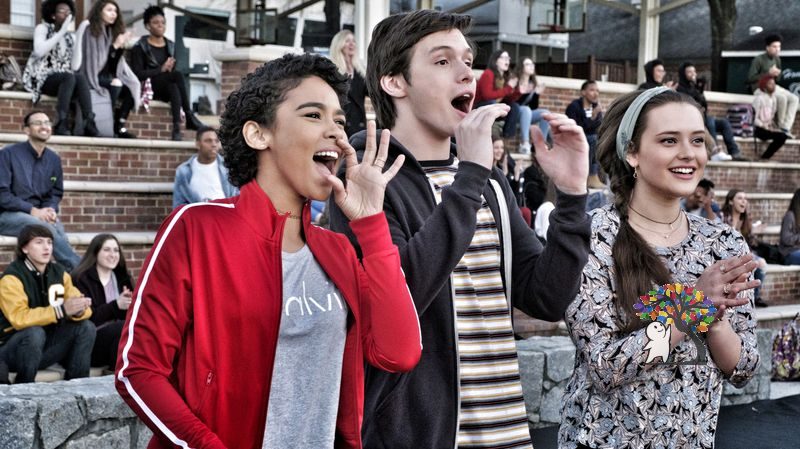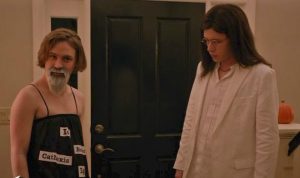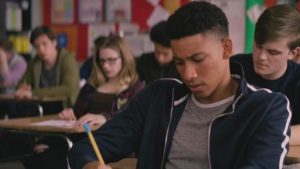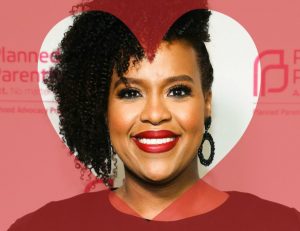On how “Love, Simon” Handles Coming Out

Unless you’ve been living under a rock, you know that “Love, Simon” Made its North American release last weekend, on Friday, March 16th. The film stars the quirky and charming Nick Robinson, and is directed by Greg Berlanti. The film, based on the novel “Simon vs. the Homo Sapiens Agenda” by Becky Albertalli, centers around its title character as he hunts for the true identity of Blue, Simon’s anonymous online crush. Simon does this while trying to hide his homosexuality from all those around him.
This movie is a big deal for a couple of reasons. “Love, Simon” is the first major studio film (sorry, G.B.F.) to center its A plot (sorry, Perks of Being a Wallflower) on a gay teenage romantic relationship. The movie is also a financial success, racking up nearly 25 million in the U.S. box office after its first week in theatres. Critics and viewers alike have also given extremely positive reviews to the movie, calling it sweet, heartfelt and funny.
I, a Bitter Gay Person
Traumatized by my teens, was skeptical when my eyes first laid upon the trailer. At first Glance, “Love, Simon” looked like a gay man’s fantasy of perfect homosexual teenagedom. “This beautiful soft-spoken white boy won’t reflect my personal history and that’s not fair!”, I thought to myself. After heading out and watching the movie, I’m here at my computer to tell you all that I’m currently shoving my own foot in my mouth as I type to you.
“Love, Simon” is a fantastic movie, but not for the reasons you might think. As teenage romance movie plots go, it’s familiar. There are other LGBT movies (and shows) out there that have much more original plots. Arguably, this familiarity was a smart move for the filmmakers; it’s probably what prompted so many casual viewers to buy tickets. The dialogue – though cheesy at times – makes for some pretty light-hearted fun and some hilarious moments, but it is not dissimilar to anything you’d hear in a John Hughes movie. Where “Love, Simon” wins is its optimism. I love “Love, Simon” because it is exactly what I thought it was going to be. A fantasy of perfect homosexual teenagedom. And it’s awesome.
Okay, if you haven’t seen the film, I’d recommend you stop here because I’m about to spoil a whole lot of stuff for you.
Here’s why you probably felt so satisfied after watching “Love, Simon”.
It’s Relatable

… To a degree. I don’t know how things work where any of you live, but I live in Toronto and here, school starts at 8:30 am. I didn’t have a car to drive – some of you might have or do – but If I did have one, I know I wouldn’t have been a good enough friend to pick up three other people and hit up a coffee shop before that start time. I can barely wake up on time now.
And can we agree Abby Suso (played by Alexandria Shipp) should have thrown a drink in Martin’s intrusive little face when he stood up and started yelling in the middle of Waffle House?
I’m just being picky.
The Closet

Where this movie does do a good job, is the telling of the coming-out process. I cringed in my seat because I know how it feels to have a parent ask me about my “girlfriend”, or to have a friend to ask what kind of girls I’m into. I cringed harder when Simon watched The Bachelor with his family because I understand the awkwardness that comes with hearing a family member make gay jokes at – unbeknownst to them – your expense.
The movie spends a lot of time with the inner dialogue of a closeted Simon, which is something that many screenwriters tend to rush or roll over. Simon has a loving family and supportive friends, but he still can’t bring it within himself to come out to them. Simon himself reassures his family and us, the audience, that he is more than his sexuality and the same person he’s always been. But he can’t seem to truly believe it until his mother assures him herself.
This self-doubt is something that anyone who’s spent time in the closet can understand. I was lucky enough to have similar supports and even I found the words “I’m gay” crippling.
It’s Ideal
This is not to say that Simon had no hurdles to jump over in the struggle to find love and happiness. A movie without a problem is no movie at all. But the ways in which these problems absolve doesn’t only give us satisfaction; it makes us wish our lives were that simple. “Love, Simon” allows many of us to experience the positive responses that we so desired when we came out.

Friends
The movie establishes Leah, Abby, and Nick as Simon’s best friends. Simon first comes out to Abby, who responds simply with an “okay”, an “I love you”, a smile and a hug. No questions asked. Abby is not surprised, nor did she know Simon was gay prior to the conversation. Abby’s response is the one we all hope for when we come out to our friends.
Leah and Nick find out about Simon’s sexuality later on, and all three friends eventually end up furious with Simon. But there is tension on their end not because of Simon’s sexuality, but because of his dishonesty.
Family

Despite being outed online, Simon gets the chance to come out to his parents on his own. Though their initial interaction is an awkward one, and Simon avoids his family in the subsequent week, Simon’s parents never stop reaching out to tell their son that they love him and that they are proud of the person that he is.
Simon’s dad even makes a point to take back the jokes and assumptions he made when he thought his son was straight.
These scenes had my partner and I in tears. While he was touched by the onscreen mother-son moment (I’m sure if you’ve seen the movie, you heard someone sobbing in the theatre), I cracked at Simon’s post-coming-out talk with his father. The words of validation Simon receives from his father are words I may never hear from mine, and this scene allowed me to feel that support, even if it was only vicarious.

School
This scene was perhaps the most cathartic for me, personally. On Simon’s first day back at school as an outed gay man, two jocks strut into the cafeteria and make a mockery of Simon and their openly gay classmate Martin.
Ms. Albright (played by Natasha Rothwell) shut. It. Down. Albright not only yelled their names and sent them to the principal’s office, she told those jocks what we only wish our teachers and authority figures said to our bullies. “You can’t talk to us like that!” they exclaim. Yes she did!
This scene was important on so many levels. This scene felt made specifically for those of us who attend school or work in hostile or un-protective environments where bigotry can go unchecked. This scene was a response to “well that’s just how things are around here”.
In Conclusion,
I could go on and on about this movie, but I’ll stop here, as I think I’ve made my point. This movie grounds itself in a world of best-case scenarios. This movie is not relatable in the sense that it is about a homosexual boy who was abandoned by his friends and punished by his family after he came out. This movie is not about a boy who got bullied so often because he was gay that he had to transfer out – or worse. This movie is not about a boy who met someone online and things didn’t work out because the internet is weird. Personally, I think a lot of us have seen enough of all of that in our everyday lives to see that on film.
“Love, Simon” gives us the opportunity to see a world of positivity through Simon’s eyes. It gives us the chance to see what coming out could be for future LGBT kids as they grow up and learn what it means to be themselves. It’s a gay fantasy. And that’s amazing. After all, isn’t that what the magic of cinema is for?
What did you think of this review? Did you have something different to say about “Love, Simon”? Would you like Psych2Go to give more in-depth movie reviews? Let us know in the comments below!



[…] LGBTQ+ representation in film and TV has been improving over the years – see this article on “Love, Simon” – independent creators have proven themselves to be way ahead of the […]